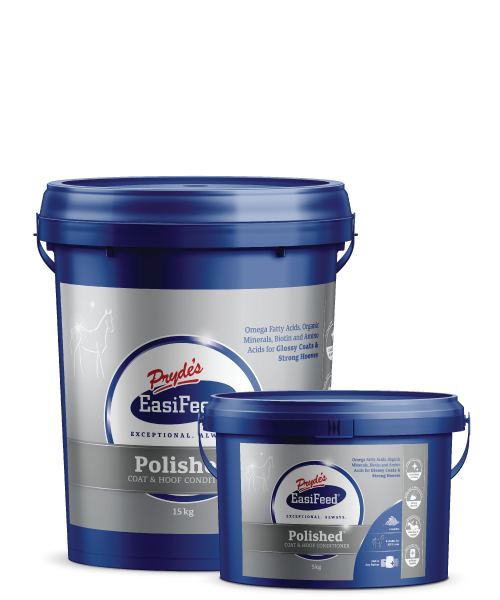Biotin is a vitamin essential for many functions in a horse’s body, including fatty acid synthesis, protein and energy metabolism and cell proliferation. For horses, biotin is best known and most commonly used to improve hoof quality. There are many biotin supplements available. Some contain biotin by itself while others have nutrients like additional amino acids and organic minerals added. These supplements are marketed as hoof and sometimes coat supplements and the one thing they usually have in common is they can be expensive. So while we do know that biotin is useful for some horses, the question is, does your horse need it added to its feed?
Biotin is naturally available to your horse
Your horse has access to two sources of natural biotin. Biotin is contained in most feeds and forages, particularly green fresh forages. In addition, the bacteria in a healthy horse’s hindgut produce biotin which is made available to the horse.
Therefore a horse on a forage based diet with a healthy hindgut should not need to be supplemented with biotin. BUT there are plenty of horses on this type of diet with poor quality hooves. Often horse owners turn straight to biotin in this situation to improve hoof quality. However, it is unlikely a biotin deficiency is causing the problem, which means adding more biotin to the diet certainly isn’t going to fix it.
An unbalanced diet causes poor quality hooves
While supplementing with biotin may seem a good solution to improve hoof quality, it won’t help if the rest of the diet is unbalanced. Minerals like copper and zinc and good quality protein all need to be in the horse’s diet in balanced quantities for the horse to grow quality hoof.
The best way to achieve good quality hooves
Feed a completely balanced diet! If your horse has poor quality hooves it is likely its diet is missing something and it needn’t be biotin. Three simple steps to achieving good quality hooves are:
1. Use nutrition software or ask for a free diet analysis from your feed supplier to put together a balanced diet for your horse that meets its needs for protein, essential amino acids, minerals and vitamins. That way you will know your horse has everything it needs to grow good quality hooves.
2. Base your horse’s diet as much as possible on good quality forage so the fibre fermenting bacteria in the hindgut can make lots of natural biotin.
3. Avoid feeding uncooked grains (with the exception of oats) as these can upset the balance of bacteria in the hindgut and reduce their natural production of biotin.
You can only influence the quality of new hoof being grown, so once you have put these steps in place it may take up to 6 months before you see the positive effect in your horse’s hooves so a little patience is required.
When should you use biotin?
There are some situations that may warrant biotin supplementation. These are:
1. If your horse is recovering from a disease that affected its hooves like laminitis or seedy toe. In these situations biotin may help to speed the growth and improve the quality of new hoof.
2. If your horse has been maintained on a high grain diet for an extended period of time. This applies to off the track thoroughbreds who often have poor quality hooves. Their hoof problems are likely at least partly due to the impact of the high grains diets they are fed during training on the health of the hindgut. It can take some time for a healthy population of bacteria to re-establish so biotin supplementation may be warranted while this is happening to make sure the horse is receiving enough biotin.
3. If your horse has been on a long term dose of oral antibiotic. Oral antibiotics can alter the population of bacteria in the hindgut which again may reduce the natural production of biotin.
4. If your horse is old and has lost some function in its hindgut. Older horses tend to have hindguts that appear to not function as well as they used to which may reduce the production of biotin. If your horse is old and its hoof quality is deteriorating biotin supplementation may help.
If any of these situations apply to your horse or if your horses hoof quality is poor despite being fed a balanced diet it is possible that it is not receiving enough biotin. At this point, the only way you are going to know if adding biotin to the diet will help is to feed it. It certainly won’t hurt your horse but you will have to feed it for about 6 months before you see any effect.
How much biotin needs to be fed?
To really influence hoof growth and quality you will need to feed between 4 mg and 8 mg of biotin per 100 kg of your horse’s bodyweight per day for a minimum of 6 months. For a 500 kg horse, this is equivalent to 20 mg – 40 mg of biotin per day. When buying biotin supplements check to make sure that the product you buy does supply this amount of biotin in the recommended daily dose and compare products based on how much it costs to provide this amount of biotinas well as whether the supplement provides additional useful nutrients for your horse.
Dr Nerida Richards
Equilize Horse Nutrition Pty Ltd


